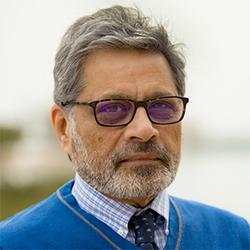Ravi Shankar has been in the field of international education for more than 20 years and has worked in various types of institutions, ranging from small professional institutions, to a community college, to a major research institution.
When did you join NAFSA?
I first joined NAFSA in 1985 and after a hiatus from 1987-1992, rejoined in 1993 and have never lapsed!
What brought you into international education? Why is international education important?
It was quite by accident really; I didn’t even know the field existed. I was about to launch into international development as a career until at a gathering with colleagues, a discussion ensued where one of my colleagues turned to me and said, “Do you realize that those of us from the ‘third world countries' never thought we were underdeveloped, until someone told us that we were underdeveloped.” Well that changed my perspective and I happened to be at the right place at the right time for my first job as an international educator. The rest, as they say, is history!
What attracted you to NAFSA leadership?
I got involved in leadership because I think it’s an opportunity to engage, voice, and perhaps even influence public policy-with congressional leaders on Advocacy Day, but also with people from federal agencies with whom we can collaborate and build relationships. Plus, being a leader is also about perception. If you’re a leader, you’re active, whereas if you’re just a member, then by the very sense of the word “member,” it’s a more passive participation in the field. You as the individual benefit more from everything that NAFSA has to offer if you take on a more active role rather than a passive one.
Why is the work of NAFSA leaders important?
Because it strengthens the association by contributing a different, creative energy. NAFSA leaders also contribute to their institutions’ reputations. I think our institutions benefit from our work as NAFSA leaders. It brands and positions the institution.
How did your NAFSA leadership begin? What was your first position as a member-leader?
I began in 1995 or 1996, I think. I was a two-year rep in region V. When I first came back to IE, I was working at a community college and got really involved in community college issues at the state, regional, and national levels. I founded the Northern Illinois Community College Association with a few of my colleagues and we were actively advocating for these issues at the NAFSA regional conference. I got a call from region V to be on their team and I said, “Absolutely.” I was appointed to the national membership committee and I worked on workshops for years, as a chair and as a presenter. My impetus was advocating for community colleges and two-year colleges. In my involvement with NAFSA leadership, I’ve been driven by trying to find the best platform for advocacy.
What constitutes strong leadership?
The ability to articulate a clear vision for the organization, association, or unit that one’s responsible for and building up the supportive infrastructure under which the team operates. I would say those are the most important aspects of successful leadership.
Ravi Shankar

